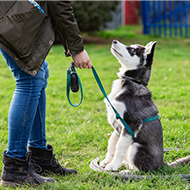
Comprehensive study confirms negative effects of aversive-based training
A new study funded by the Universities Federation for Animal Welfare (UFAW) has found that dogs trained with aversive-based methods are more stressed and exhibit a more negative mental state than dogs trained using rewards.
Researchers from the University of Porto aimed to evaluate the effects of training methods which used both positive and negative reinforcement on dogs during and after training sessions. As opposed to collecting data using owner surveys, this study is entirely based on data collected by the researchers, providing much stronger evidence.
Video recordings were taken during training sessions to analyse the frequency of stress-related behaviours such as yawning and lip-licking. Researchers also took saliva samples to test for the presence of stress hormones.
The results showed that dogs that took part in the positive-reinforcement training sessions demonstrated fewer stress behaviours and had levels of stress hormones than dogs in aversive-based training sessions.
To evaluate welfare outside of training sessions, the dogs took part in a cognitive bias task which aimed to assess the animals' underlying emotional state.
For this task a food bowl was placed in two separate locations. If the bowl was on the left side of the room it would always contain a treat and if it was on the right it would always be empty. After the dogs had learnt to distinguish between the two locations, the bowl was placed in various 'ambiguous' positions.
The researchers found that dogs trained with aversive-based methods moved more slowly towards the ambiguous bowls – implying a more negative mental state – than dogs trained with reward-based methods or even dogs that had received less of the aversive-based training.
According to the study authors, these findings indicate that, overall, aversive-based training methods may compromise the welfare of companion dogs both within and outside the training context.
Dr Vieira de Castro, lead author of the study, said: “Understanding the effects of training methods on companion dog welfare has important consequences for both dogs and people.
“Both determining and applying those training methods that are less stressful for dogs is a key factor to ensure adequate dog welfare and to make the most of the benefits we humans derive from interactions with dogs.”



 FIVP has shared a survey, inviting those working in independent practice to share their views on the CMA's proposed remedies.
FIVP has shared a survey, inviting those working in independent practice to share their views on the CMA's proposed remedies.